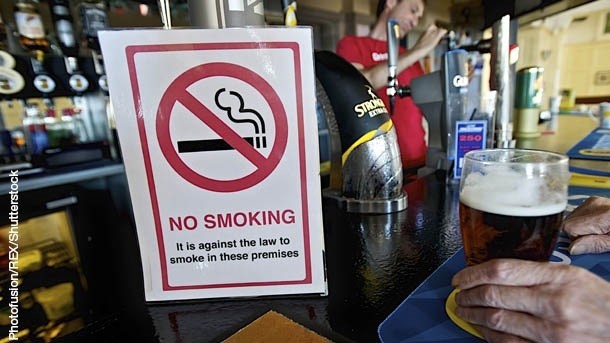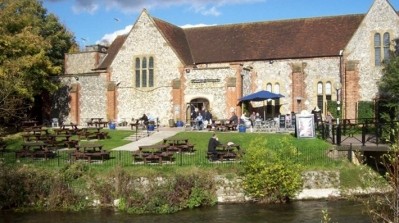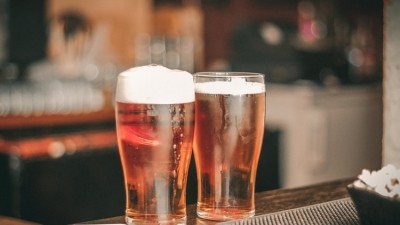A breath of fresh air: how the smoking ban has changed the pub trade

Smoking inside pubs seems strange now, but it is only 10 years since it was commonplace. Smoke-filled bars were the norm, with customers lighting up as they enjoyed a pint. Then the smoking ban came in and, with it, a revolution in pub trade and operations.
When the ban first came in, no one knew what was going to happen, said Becky Salisbury, director of Salisbury Pubs. “At the time we were utterly petrified at the thought of what the smoking ban might do.
“Pubs had been this wonderful capsule of chat, communication and conversation. Suddenly it became disjointed – we had lots of people saying it just wasn’t the same.”
She says this was the thing people missed most. “People had to now get up and go for a fag, shivering outside. But, smokers soon started to meet new people. And now, 10 years later, the percentage of people getting up and going outside for a fag is tiny compared to what it used to be.”
Phil Strong, former managing director of Chameleon Bar and Dining, said that his premises didn’t see an immediate fall in trade.
Smoking ban dates
■ February 2006: Parliament votes to make it illegal to smoke in public places as part of the Health
Act 2006
■ 26 March 2006: Smoking is banned in public areas in Scotland
■ 2 April 2007: Smoking is banned in public areas
in Wales
■ 1 July 2007: The Health Act 2006 makes it illegal to smoke in all enclosed work places, including pubs, in England
“We were more of a pub restaurant business even then. We had planned for the smoking ban by putting smoking shelters into the sites we had. It slowly changed and a lot of trade was lost from the original community pub businesses. Before the ban, a lot of people that came out to drink were not eating – they
were smoking and socialising. Having to go outside to smoke disrupted that.”
In an effort to retain these customers, Strong said they invested money in smoking huts with lighting and new furniture. They also put on drinks offers to soften the blow for customers.
Nick Bish, former chief executive of the Association of Licensed Multiple Retailers, said the pub industry in England had advance warning as Ireland, Scotland and Wales brought in bans.
“There was a great deal of time to prepare, and there were constant efforts to discuss alternative ways to an all-out ban inside before the axe fell. This included suggestions like dedicated smoking rooms and improved ventilation systems.
But he said: “Imaginative and forward-thinking people did their best to accommodate the ban.”
Impacts of the ban
However, the ban did herald a fall in numbers of a certain group of customers. The pint-drinking, cigarette-smoking, male regular. And this had specific consequences for wet-led pubs, of which there were many when the ban came in.
“Before the ban, pubs were more male-driven drinking-establishments where the customers would be in six or seven days a week drinking several pints and smoking while they drank,” said Strong.
However, there was already a trend among this group for buying cheaper alcohol from off-licences and supermarkets to drink at home. He says that the smoking ban in pubs accelerated this trend, which led to the further decline in that group of customers.
“But it opened up opportunities for new business as more women and families came to the pub,” Strong added. “We promoted our pubs’ smoke-free environments and the female friendly side of the business.”
Strong even surveyed female customers at one his pubs to find out what more they could do to attract this group. The responses led to an upgrade of the ladies’ toilets, with the installation of full-length mirrors, and better lighting. He said that his female customers also highlighted the importance of good customer service, something that may not have been paramount in testosterone-heavy, male-dominated drinking dens.
Food sales rise
Another shift was that people felt more comfortable bringing their children to pubs as there was no second-hand smoke, said Salisbury. And while food already a growing part of the trade, the ban certainly supported more rapid growth.
Unsurprisingly, Bish said businesses that served food welcomed the ban, and had been accepting of it for quite some time.
Salisbury agreed: “The biggest change in trade as a result of the smoking ban is pubs providing food. Before the ban it was just seen as an alternative thing for pubs to do. But pubs have now upped their game, you can go almost anywhere and have a decent meal. It might not be deluxe, but compared to the slop that used to be served, it has changed dramatically.”
She said that her business decided to stop smoking in the dining room two years before the ban came in. “We did that because we spoke to our customers, who said that’s what they wanted. We were gobsmacked that no one complained. We thought we were being radical at the time.
“I think that was the way a lot of pubs were going, it was the will of the people. People were backing health conversations. There was a lot of press at the time about smoking and health.
Health of bar staff
In 2011, a government review of the impact of the smoking ban found that the health of bar workers had improved significantly since the 2007 ban in England.
Employees that self-reported respiratory symptoms decreased from 67% before the ban to 40% a year later when the ban was in place. The review said there was a similar decrease in sensory symptoms related to second-hand smoke such as sore eyes or throat.
“A lot of businesses hoped that it wouldn’t happen, and then, of course, it did. We were ahead of the game, but I think there were a lot of pubs that were not, and maybe this was the start of the demise of the pub.”
Salisbury also pointed out that the smoking ban has had a direct impact on pub revenue from gaming machines because the clientele is no longer single men drinking and smoking at the end of the bar. “Gaming machines had provided huge profits for pubs, but that has now disappeared. It changed the whole dynamic of the pub gaming industry.”
Paul Harbottle, group commercial director at Ei Group said the group consciously supported their publicans in adapting their business through this period by developing relevant food offers and marketing themselves to a new demographic of customers that may not have been previously attracted to pubs.
What was clear from the outset was that those publicans with a well-considered ‘plan for the ban’ enjoyed a considerable advantage over their competitors, with many gaining new custom as a result.
“For many, this plan meant an increased focus on food to help widen their consumer appeal, particularly addressing the potential
of trade in the mornings, with more sophisticated breakfast, brunch and coffee propositions.
“For others, the ban was a catalyst to utilise their outdoor space so it became an extension of their trading areas, with increased investment in all-weather solutions, shelters and heaters. Many pub gardens are now transformed from their pre-ban state.”
But, there were people who were unhappy about the lost business.
Bish explained: “There were people who were resistant [to the ban], and they did not have any alternatives in place for their customers.
“The disadvantages were all at the front end, with the enforced changes in consumer habits in their leisure activities which pubs were trying to serve – and with a stroke it was all changed. It was painful for many, and catastrophic for a few.”
But, 10 years on, the ban has proved to be a huge success for the industry overall, said Strong.
“Previously pubs were male dominated, but the ban has helped make it acceptable for everybody to go in a pub in a way they were not able to before.”
Bish said: “Looking back, it was a success in terms of health and for the transformation of food in pubs. It has been a business success too.
“Publicans that anticipated the ban not only adapted, but did so in style. No one thought it would do what it has for British food. There are now options for people to eat out, with more choice, better customer service with improved cleanliness and overall higher quality.”
Trade ‘has never recovered’
However, Strong added that the frequency of pub visits has gone down. “To be able to replace the original male drinkers, who came in regularly and drank several pints, you need about 10 or 15 occasional customers. But, he added, eating in pubs has accelerated enormously and that would have been unheard of in the days when people were smoking at the bar.”
Not everyone thinks the ban has been a success. Paul Pavli, managing director, leased and tenanted, at Punch, told The Morning Advertiser: “I don’t think the pub trade has ever recovered [from the introduction of the smoking ban]. The pub environment is nicer now and people who go into pubs now are nicer than they used to be too. But actually, financially, I don’t think it’s ever recovered.”
Pavli agreed that the pubs today that are “thriving” – food pubs in particular – are doing much better, but he lamented the fate of many wet-led pubs. “Wet pubs may be nicer to run, work in, and visit – and maybe more women have started going to pubs since the smoking ban – but financially, they are not the same.
“It’s happened, and the industry has moved on, but these wet-led pubs that were affected at the time were never going to get back to the levels of sales they did before the smoking ban.”
But as reported in our The Big Interview with Craft Union’s Frazer Grimbleby, certain wet-led pubs are doing well without indoor smoking. Harbottle added: “Our different operating models, such as the fast-growing Craft Union Pub Company, show that community drinks-led pubs can continue to thrive if they have the right customer focus and proposition.
“Consumers remain overwhelmingly supportive of the smoking ban and it has helped change pub-going behaviours and the perception of them as more inclusive, family-friendly venues.”







